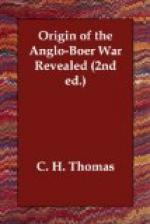There were numerous permanent agents drawing large emoluments in Europe also, and emissaries to different places abroad, some touring in America, England, and the Continent, as the Rev. Mr. Bosman did recently, and also the P.M.G., Isaac van Alphen.
Much energy and money were also devoted to electioneering campaigns, as had notoriously been done in the Cape Colony towards bringing in a Bond majority. Large sums are spent in the diplomatic arena in Holland to propitiate foreign statesmen, soliciting sympathy, and in coquettings for Transvaal allies. One of these attempts that failed had been with Germany. It would appear that some progress had been feasible some years ago in temporarily luring Emperor William to favour a Holland-Transvaal combination, but when that sovereign had at last penetrated the infamous business that lay behind it all, he, as a true “Bayard” promptly washed his hands clean of it, preferring to forego obvious brilliant advantages for his people than to sully Germany’s fair fame in a connection amounting to no less than abetting a foul conspiracy.
The readers of the Johannesburg Standard and Diggers’ News will remember among the staple attacks upon capitalism quite a series of articles intended to decoy mining artisans and operatives to Boer views. Secret agents were also employed for that purpose, and to induce the belief that the Government was the enemy of capitalism, and would champion its victims (the mining operatives) in the State. It would support miners and the working class generally against attempts to curtail the just rights of labour, and to parade its sincerity actually passed a law constituting eight tours a legal day’s labour. With such coquettings it was hoped to gain the miners’ confidence and adhesion. Those men were, however, not to be taught by quasi-socialistic professions of concern, and when, some months later, the exodus prior to the war occurred, they nearly all left, much to the disgust and discomfiture of the Government, which had counted upon them to stay to work the mines for its own account when the moment should arrive.
The appropriation of gold mines and their exploitation for Government benefit bring about a singular anomaly for a nation engaged in war, viz., that of a plethora of gold and a scarcity of paper currency, the Transvaal mint coining the sinews of war at the expense of its victims, but the plundered gold after all not equalling commercial paper values.
In connection with the foregoing remarks the following may also be said. States professing neutrality still permit themselves to trade with the Transvaal to a large extent. It is notorious that that State possesses no funds available for payments except the gold derived from the misappropriated mines. The output is seized in its entirety, and not limited to the extent accruing to British scrip holders only. The hustling rivalry of doing business with the Transvaal thus involves receiving stolen money in payment of trade accounts. We see the receivers eager to stand upon the same platform as the thief, thus not only as his political partisans, but also as his accomplices.




